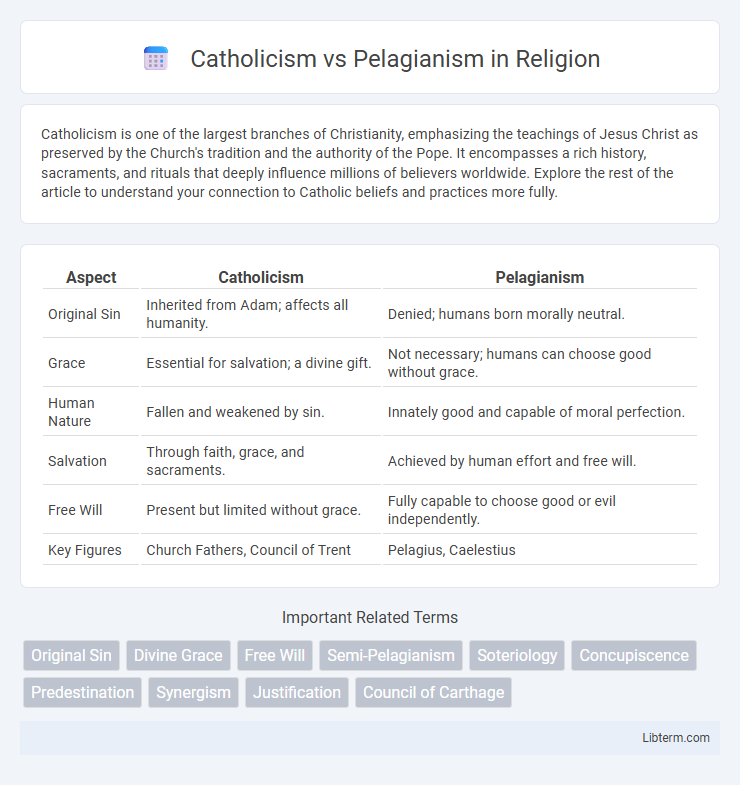Catholicism is one of the largest branches of Christianity, emphasizing the teachings of Jesus Christ as preserved by the Church's tradition and the authority of the Pope. It encompasses a rich history, sacraments, and rituals that deeply influence millions of believers worldwide. Explore the rest of the article to understand your connection to Catholic beliefs and practices more fully.
Table of Comparison
| Aspect | Catholicism | Pelagianism |
|---|---|---|
| Original Sin | Inherited from Adam; affects all humanity. | Denied; humans born morally neutral. |
| Grace | Essential for salvation; a divine gift. | Not necessary; humans can choose good without grace. |
| Human Nature | Fallen and weakened by sin. | Innately good and capable of moral perfection. |
| Salvation | Through faith, grace, and sacraments. | Achieved by human effort and free will. |
| Free Will | Present but limited without grace. | Fully capable to choose good or evil independently. |
| Key Figures | Church Fathers, Council of Trent | Pelagius, Caelestius |
Introduction to Catholicism and Pelagianism
Catholicism is a Christian doctrine emphasizing original sin and the necessity of divine grace for salvation, rooted in the teachings of the Church Fathers and ecumenical councils. Pelagianism, founded by Pelagius in the 4th century, rejects original sin and asserts that humans can achieve salvation through free will and personal effort without divine grace. The theological conflict between Catholicism and Pelagianism centers on the nature of grace, human nature, and the role of free will in salvation.
Historical Origins and Development
Catholicism emerged as a dominant Christian tradition rooted in apostolic succession and the teachings of Church Fathers, emphasizing original sin and divine grace in salvation. Pelagianism, originating in the early 5th century through the British monk Pelagius, denied original sin and asserted human free will's sufficiency in achieving righteousness without divine grace. The theological conflict culminated in the Council of Carthage (418 AD), which condemned Pelagianism as heresy, shaping the development and doctrinal clarity of Catholic soteriology.
Core Theological Differences
Catholicism teaches that original sin taints human nature, necessitating divine grace for salvation, while Pelagianism denies original sin and asserts that humans can achieve righteousness through free will alone. Catholic doctrine emphasizes the necessity of grace for justification and sanctification, highlighting sacraments as means to receive this grace. In contrast, Pelagianism rejects the need for divine grace in moral effort, promoting human ability to obey God's law without supernatural aid.
Doctrine of Original Sin
Catholicism teaches the Doctrine of Original Sin, asserting that humanity inherits a fallen state from Adam and Eve, necessitating divine grace for salvation. Pelagianism denies this inherited sin, claiming humans are born morally neutral and capable of choosing good without divine aid. The Catholic Church condemned Pelagianism as heresy, emphasizing original sin's essential role in human reliance on baptism and grace.
Views on Human Nature and Free Will
Catholicism teaches that human nature is wounded by original sin, impairing free will and necessitating divine grace for salvation and moral good. Pelagianism asserts that human beings are born innocent without original sin, possessing full free will to choose good or evil independently of divine grace. The Catholic Church condemns Pelagianism for underestimating humanity's need for grace, emphasizing that free will alone cannot achieve redemption.
Role of Divine Grace in Salvation
Catholicism emphasizes that divine grace is essential for salvation, viewing it as an unmerited gift from God that enables humans to overcome original sin and cooperate in their sanctification. Pelagianism denies the necessity of divine grace for salvation, asserting that human beings can achieve righteousness through their own efforts without the aid of God's grace. The Council of Carthage (418 AD) condemned Pelagianism, affirming the Catholic doctrine that grace is indispensable for initiating and sustaining the process of salvation.
Key Figures and Their Teachings
Catholicism, guided by key figures such as St. Augustine, emphasizes original sin and the necessity of divine grace for salvation, teaching that human nature is inherently fallen and incapable of achieving righteousness without God's intervention. In contrast, Pelagianism, founded by Pelagius, asserts the inherent goodness and free will of humans, denying original sin and claiming individuals can attain salvation through their own efforts without divine grace. The theological clash between these teachings profoundly shaped early Christian doctrine, with Catholicism ultimately condemning Pelagianism as heresy at the Council of Carthage in 418 AD.
Official Church Responses and Condemnations
The Catholic Church officially condemned Pelagianism as a heresy at the Councils of Carthage (418 AD) and later reaffirmed this stance through the Council of Ephesus (431 AD), emphasizing the necessity of divine grace for salvation. St. Augustine's theological arguments against Pelagianism played a crucial role in shaping the Church's doctrine on original sin and human free will. Papal encyclicals and Church Fathers consistently uphold the belief that salvation cannot be achieved through human effort alone, countering the Pelagian assertion of moral self-sufficiency.
Lasting Influence on Christian Thought
Catholicism's doctrine of original sin and divine grace profoundly shaped Western Christianity's understanding of human nature and salvation, emphasizing the necessity of God's grace for redemption. Pelagianism, rejecting original sin and asserting human free will's sufficiency for moral perfection, was condemned as heresy but provoked critical theological debates on free will and grace. This conflict between Catholic and Pelagian views influenced key doctrinal developments, notably the Councils of Carthage and Ephesus, solidifying the orthodox stance on grace and human nature within Christian thought.
Contemporary Relevance and Debates
Contemporary relevance of Catholicism versus Pelagianism centers on ongoing debates about grace, free will, and human nature's role in salvation. Catholic doctrine emphasizes the necessity of divine grace to overcome original sin, contrasting with Pelagianism's assertion that humans can achieve righteousness through their own efforts without divine aid. These discussions influence modern theological discourse, ecumenical dialogues, and ethical considerations within Christian communities regarding moral responsibility and divine intervention.
Catholicism Infographic

 libterm.com
libterm.com